#idealisation phase
Explore tagged Tumblr posts
Text
Okay so is it going to be addressed that Adolin grew up with an alcoholic father (with the whole set of organising an intervention at 15, finding him black out drank etc.) oooooor will the story be just as oblivious to it as Adolin is atm?
#Just another day of Dalinars actions not having appropriate consequences imo#Things like that are so traumatising irl and I feel like Adolin is still in the idealisation phase#I love my Kholin babies but you GOT TO digest some stuff from the past#oathbringer#stormlight archive#cosmere#brereardsstrormlight#brandon sanderson#shardposting#adolin kholin#dalinar kholin
551 notes
·
View notes
Text
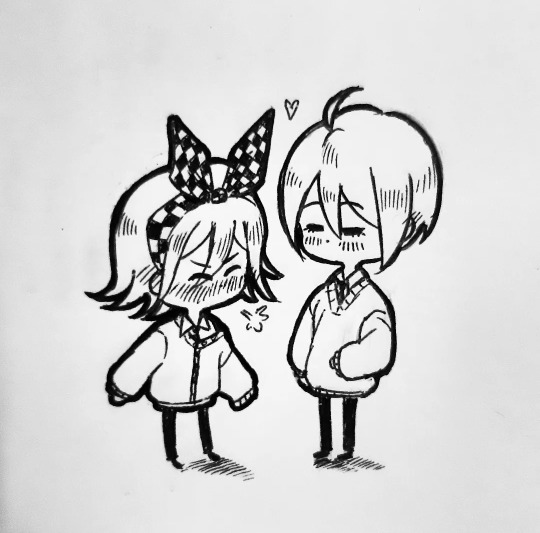
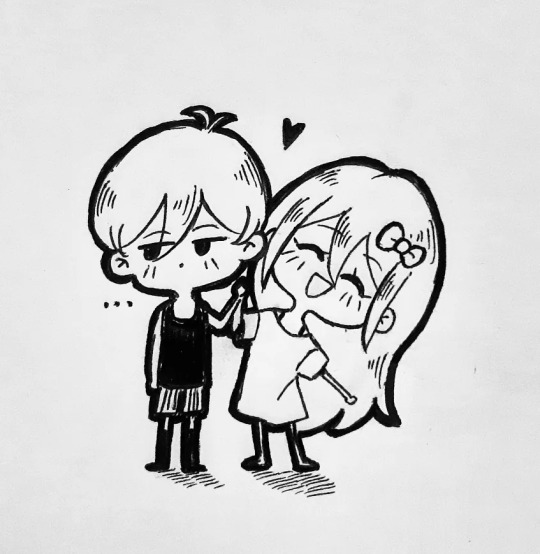
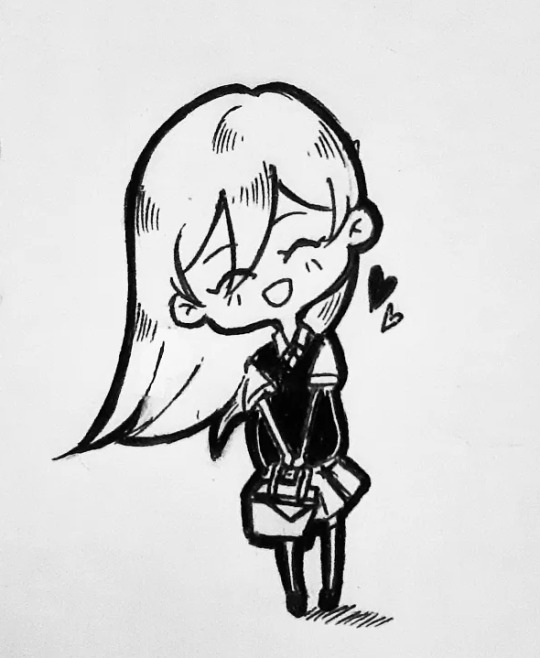
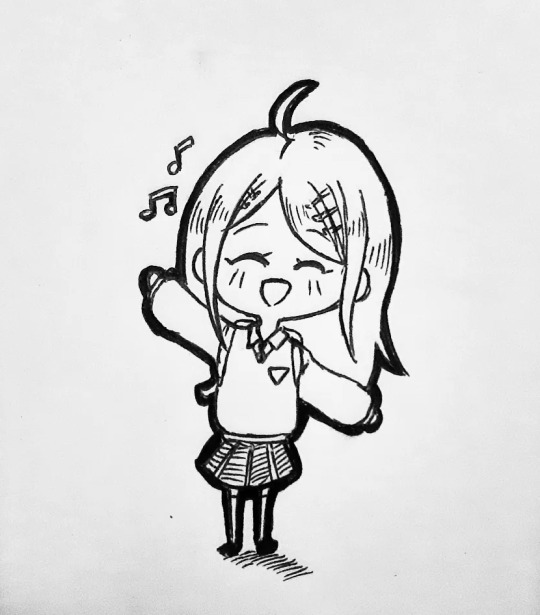
Some chibi art I made 💕
#at first i just wanted to make a new pfp for myself LMAO#making a whole merch line#would you buy this as stickers 👉👈#also i miss drawing omori sm UGH#back in my sunburn phasee 💕💕#omori and aubrey is literally the best fake ship ever#and my omori people where yall AT#i miss yalls 😭😭 pls be in my notes againn#i swear I'll post more omori cuz im kind of idealising headspace sunburn atm 😩#ALSO ALSO#kokichi with his scarf tied like THAT#ITS REAL NOT CUZ IT CANON CUZ IT CUTE#rl kokichi wouldnt do that 😔 his scarf is literally his lifeline bro wouldnt play around liddat#anyways heres me dumping my OTP and fav crack ship and my fav 2 girls on this hellsite#anyways heres the bullshit clout tags below LOL#omori fandom#omori fanart#omori mari#my art#omori aubrey#omori omori#shuichi saihara#kokichi ouma#kokichi oma#danganronpa kaede#danganronpa shuichi#danganronpa kokichi#danganronpa v3#kaede akamatsu#ndrv3
50 notes
·
View notes
Text
The way that Paul Shapera presents love in The Puppetshade Chronicles, specifically the second album, is so fascinating to me.
You have Jes, who declares "love is perfect, love is all" before shooting the girl she loves at the end of the first album, claiming it's the only way to prevent Jenna suffering and betraying her. At the end of the second album, she kills Molly after finding out that she wasn't tortured into betraying her but actually wanted to abolish the monarchy of her own volition. Jes claims "now the girl I love is gone". To me, it seems like Jes has such an idealised view of love that anything that doesn't live up to her perfect expectations must be eradicated. It fits with her character, being a princess who's used to getting what she wants and views anything inconvenient to her as unacceptable. But before she kills Molly, she hesitates and changes her mind multiple times, almost like her view of love is shattering as she realises that it isn't perfect, that it doesn't guarante that there will be no conflict between people who love each other.
This is even more interesting compared to Paisley Piper's view of love. She thinks that love is painful and maddening. She says that love can be sweet, but ultimately it will entice you and drive you crazy. And yet at the end of the album she decides to go and rescue her love. Entirely the opposite to Jes, she acknowledges the pain caused by love and how it's far from perfect, but decides to help the person she loves.
Then you have Oki, who seems entirely dissilusioned with love (and every aspect of existence), saying that his friend Jeza said "love was just a fleeting treat, illusion to me now." He's clearly been caused a lot of pain by love and is definitely going through a sadistic phase, but seems to genuinely love the other Puppetshades.
And all this just makes me wonder how Jenna, L3X and Yery will think of love now. Jenna has been betrayed by a person who claimed to love her, L3X loves Jenna but her love makes him feel guilty, Yery has had the person he loved most killed. They've all seen people they love murdered. And then there's Cobalt Rose, who can almost be seen as a metaphor for how people who are loves live on in the memories of those who loved them. I think love is such a fascinating driving force and motivation behind this story and I can't wait to see how this theme develops.
#shaperaverse#puppetshade chronicles#The black beyond#The lost kingdom#I haven't listened to the third album but I'm going to I can't wait
41 notes
·
View notes
Text
Have really been in the mood to keep drawing my designs for the “they survived” Domino Squad AU (designs here )
So have my full armour breakdowns for them. I thought I should properly sit down and get those sorted. I think it’s phase two armour? But I’m not great with those differences. Also, first sketches of the squad in colour.

Also, thought I’d give Cutup a hint of a beard since his cannon design had one. I haven’t really been drawing him with one because in my version he’s chilled out a lot in recovery from almost being eaten alive, and he’s grown his hair out. And, clones with long hair and beards are just arguably the hottest clones and I don’t think Fives would ever let him be the hot one of the group. (Edit: oh, i completely ignored this and he fully has a beard in all my other designs now.)


A few notes on armour designs I didn’t elaborate much on in the notes (and some character traits linked to it) :
Hevy’s armour is pretty basic for an ARC, but he definitely responds to anyone asking why with something about not needing elaborate armour to beat a lot of droids. He has taken on a lot of leadership roles in the company, and Rex has even made several comments about him taking over as Captain if anything was to happen to him.
Fives on the other hand got ARC armour and decided he was going to tick every single design detail he could (including the Eel helmet which probably should have been Cut’s, but he wanted his scar on his so Fives was allowed it.) Unlike the other two ARC’s, he doesn’t get an official role, but he doesn’t mind, it leaves him open to get into more trouble and not be responsible for anyone else.
Echo is still very regulation oriented, but the only known regulation he has publicly broken is modifying his armour to be mirrored so he could keep Rex’s hand print in its original position. The others tease him about this constantly. He is an exceptional strategist and is Rex’s right hand man when it comes to any sort of planning or attack strategy. He’s the most modest of the squad, and constantly talks down his abilities whenever others hype him up about his skills. He’s one of the top strategists in the GAR, but it would be a miracle if you could get him to admit that.
Cutup is ecstatic about the fact he is now covered in scars (although much bigger and less idealised than the designs on his armour) because it matches his name. He has no intention of becoming an ARC. The Rishi outpost and his long recovery changed him a lot, and left more than just physical scars, he prefers to step back from the intensity of what his brothers do, even if he was offered the promotion. The damage to one of his legs is so extensive he has very little mobility out of armour, but he and his brothers have modified his armour to have an inbuilt brace to support his injury and give him back some movement to avoid him being decommissioned. He and Kix are very close, and he sometimes works as a support person in the med tent if he needs an extra set of hands.
Droidbait is the opposite. He desperately wants to be an ARC like the other three, but has never been very fit for the position. He is the least confident of the squad, and his time separated from them on Rishi didn’t help. The commemoration bands on his leg are for those who they lost on the Rishi moon, and he won’t tell anyone the significance of there being two. He was the only person who survived the droid attack (after the other four escaped) and refuses to say how he managed to, but whatever happened made him much more anxious. The others don’t pressure him into saying anything. His opinion on the Republic has changed and he worries his brothers no longer understand.
#domino squad#star wars au#star wars tcw#the clone wars#arc trooper echo#arc trooper fives#arc trooper Hevy#clone trooper hevy#clone trooper cutup#clone trooper droidbait#clone trooper redesigns#fanart#star wars fanart#clone armor
42 notes
·
View notes
Note
What's your opinion on his Pureblood views / views on muggles?
Oh boy, here we go. This is what I would like to think as a controversial thing, especially considering Riddle as many have different opinions about his views on pure-blood supremacy. However, the way I am analysing Riddle is more looking at his psychological background and so that's how I'll answer this. ( I was quite literally clawing at the bars of my enclosure to not go into a spiel about the politics of it and stay purely psychological.)
Tom Riddle, as a student at Hogwarts, exhibited an attractive persona—talented, polite, charming, and intellectual. Despite his outward charisma and the group of 'friends' he had gathered, it is clear that Riddle harboured no genuine affection for them. Instead, he exploited these individuals, which no doubt shows his want for domination and control of others. This charismatic behaviour is simply a façade, a social mask he uses.
Riddle's public persona can be understood through the lens of pathological narcissism. All humans naturally present a public mask, but for a pathological narcissist, the discrepancy between this mask and the concealed self is honestly stark. Riddle's charming demeanour was used as a strategy to attracted admirers who no doubt fed his own narcissistic needs. This mask is also used to protect his false self from exposure, maintaining his grandiose self-image.
The narcissist's primary goal is to protect and sustain this concocted self-image. This can be visualised as a wheel, where the grandiose false-self is the hub, to which are affixed spokes. These have a specific purpose to protect and sustain the hub of false-self.
Freud's theory on the oral phase highlights the crucial role of the mother in a child's early development, fostering a sense of comfort and dependency to the mother. According to Minderop, parental influence can change the development of the human personality. Looking at these theories, who both stress the importance of parental involvement early in development and how detrimental the lack of it could be, we can attribute Riddle's lack of parental affection and the resulting emotional deprivation significantly contributing to his behaviour and attitudes. These theories support the idea of how Riddle had never seen anyone as an equal, clearly taking advantages of his followers and viewing them as below him.
Riddle's identity and beliefs were deeply intertwined with his blood status. Discovering his ancestry linked to Salazar Slytherin, which would boost his ego and sense of self incredibly, fuelling his delusions on his "idealised parent image." Then came along the revelation of his Muggle father, which shattered his preconceived notions of heritage. This discovery would obviously induce an identity crisis in the boy, igniting a war within him between the person he wants to be and the reality of who he really is. This internal conflict most likely manifested in his actions, such as punishing his father and changing his name. (Riddle's mental breakdown and identity-crisis explained more here.)
Freud states that human behaviour is more influenced by the unconscious mind than the conscious one. The unconscious mind is filled by the human’s painful memories and then tries to protect the conscious mind by hiding them. This can influence someone’s attitude, behaviour and character. For Riddle, the painful memories of his heritage continually resurfaced, despite his unconscious minds attempt to hide them. This is something that is extremely relevant to his views on pure-blood supremacy. He attempts to eradicate his past, such as changing his name to Lord Voldemort and creating Horcruxes show his struggle with his own identity clearly.
(I’m sure we all know what Voldemort actually means. Ironically enough, Riddle was so grandiose ( what a romantic, no really, he was.) as to aim to transcend humanity, (changing his name, horcruxes etc.) that by refusing to accept the inevitably of death, he also practically announces his own humanity to the world.)
Riddle's descent into blood supremacy was fuelled by a combination of person and political factors. There is the abuse he suffered from Muggles, the war he had experienced, the prejudices he encountered in Slytherin, the group of followers he gathers, and his psychopathic tendencies that all contribute to his ideology. ( Riddle cravings of power and the feeling of being in control added onto everything else, honestly makes me think of only one thing; revolution. )
Riddle's appeal to pure-blood ideologies served his ambitions, allowing him to manipulate and control those who would've previously have looked down on him. This pursuit of power mirrors the actions of many world leaders and revolutionaries who sought to reshape the world according to their ideal image. The ideal image is fuelled by internal conflict between his own past and his preconceived ideas.
(This was most likely the intended purpose for his character, as he himself is a malignant narcissist, and many psychiatrists have identified a direct connection between malignant narcissists and evil. Many well-known malignant narcissists are also serial killers and mass murderers.)
Little note I also wanted to add on even if it delves more into Voldemort territory than Riddle; Voldemort seems to punish the Pure-bloods. What I mean by this is, is that Riddle seems to be taking out the fact these pure-bloods are not the ones to usually do this kind of 'dirty work' . He seems to enjoy making them do things that they would normally view as beneath them, it's a power trip. This seems to be more retribution on his end, considering the fact despite how hard he tries he will never be a pure-blood and will never be able to leave his past behind him. (what a petty man ) TLDR : Looking into Riddle's views on Pureblood supremacy reveals a complex interplay of narcissism, early developmental influences, and political motivations.
#once again did not proofread so ignore any mistakes#what a miserable man#Harry Potter#hp fandom#harry potter fandom#hp fanfic#Tom Riddle#Tom Riddle analysis#tom riddle x reader#tom riddle fanfiction#VOLDEMORT#Tom Marvolo Riddle#Lord Voldemort#Slytherin#Pureblood#Muggle#harry potter headcanon#opinion#headcanon#the death eaters#the knights of walpurgis#the heir of slytherin
58 notes
·
View notes
Note
i think 'agony' from the into the woods musical reminds me of crowfeather (obviously not completely in context lol) mostly bc from my interpretation he's fixated on a certain ideal of romantic love but can't meaningfully commit to it. i feel like if he and leafpool were successful in their escape he wouldn't have stuck around as he would grow resentful when he realized she wouldn't complete the fantasy he wanted.
yeah i get that. i know a lot of people get annoyed at the insinuation that crowfeather *purely* views leafpool as a replacement feathertail (which is what a lot of people take from the cliff scene where he has a flashback and doesn't save leafpool from falling until she has to console him) but personally i like the idea of that projection existing and of inherently incompatible crowleaf that never get the chance to be together long enough to even get to that realisation. i don't think they could ever properly love each other but in a way that's like, unknowingly mutual
my take on it is that crowfeather is looking for a solution to his grief that involves a new partner that can fulfill what he was dreaming he could have with feathertail (which is yet another relationship that was cut short before he could get out of the initial idealisation phase) and leafpool is looking for a magical escape fantasy to sweep her off her feet and give her a ticket out of the clans because she's at a stage in her life where she's feeling boxed in and paranoid and uncertain about her future as a medcat. they're both completely and utterly in love with this idea of love and freedom they can vaguely connect to the other person, and don't really care about who they actually are, and after this is cut short pre-revelation again, and they are thrust back into their respective misery and grief in the clans, they keep dreaming via positive connotation of this love that never actually was or could even have been. cinderpelt's death, crow's loveless marriage with nightcloud, and the births of the three and breezepelt kind of lock them into those lives which just makes the lingering dream of escape and missed chance worse.
27 notes
·
View notes
Text

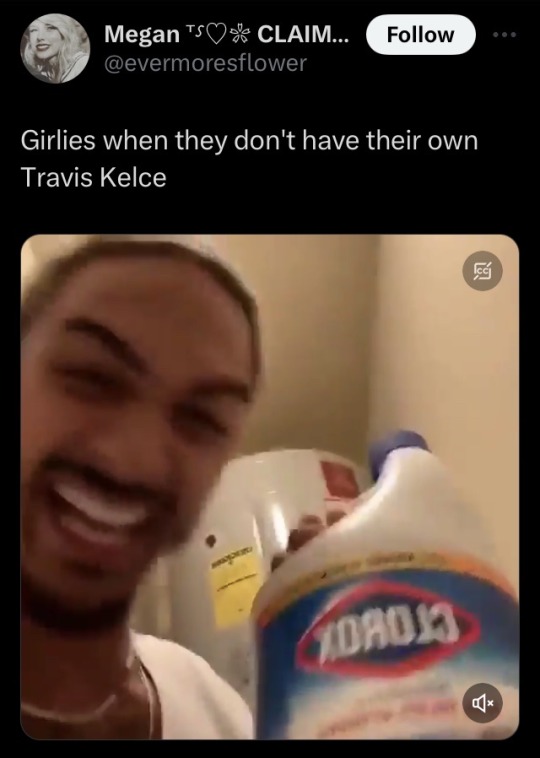
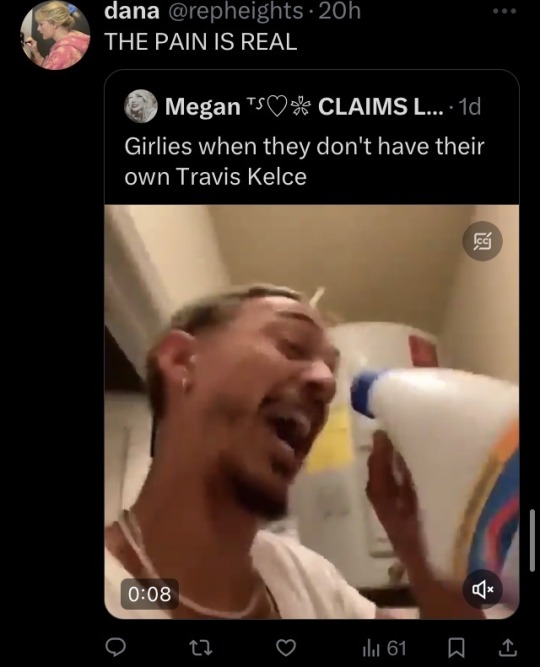
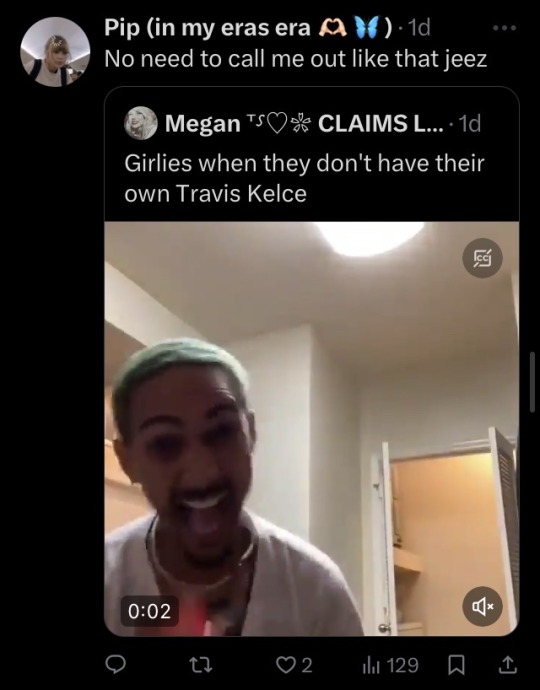

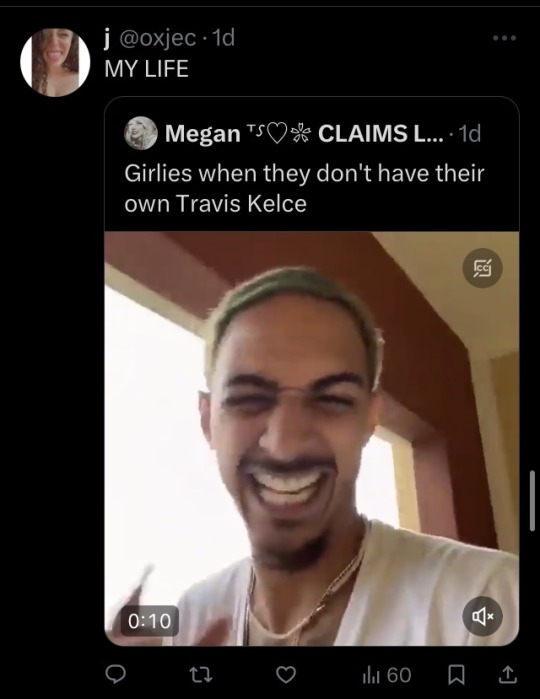

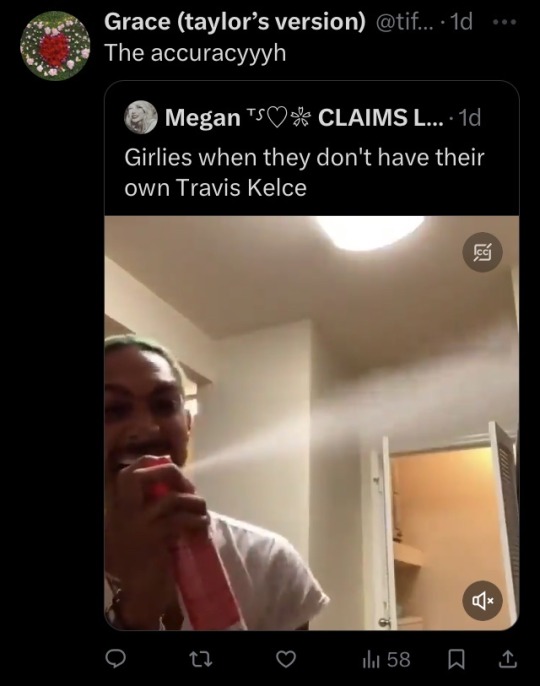
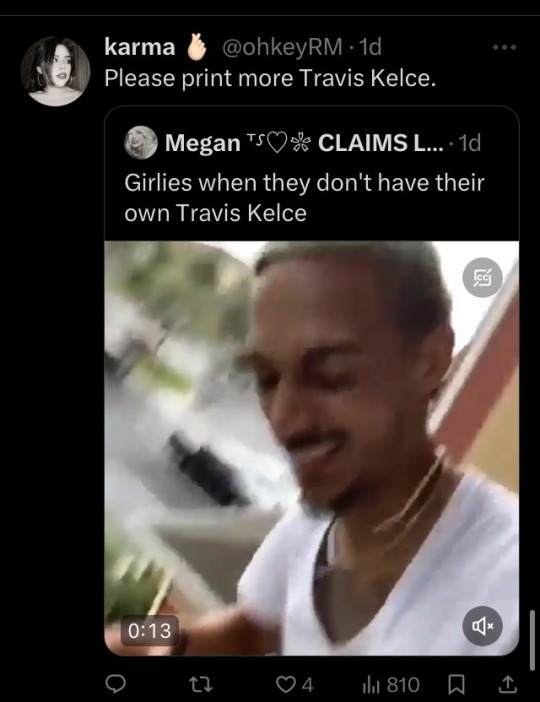
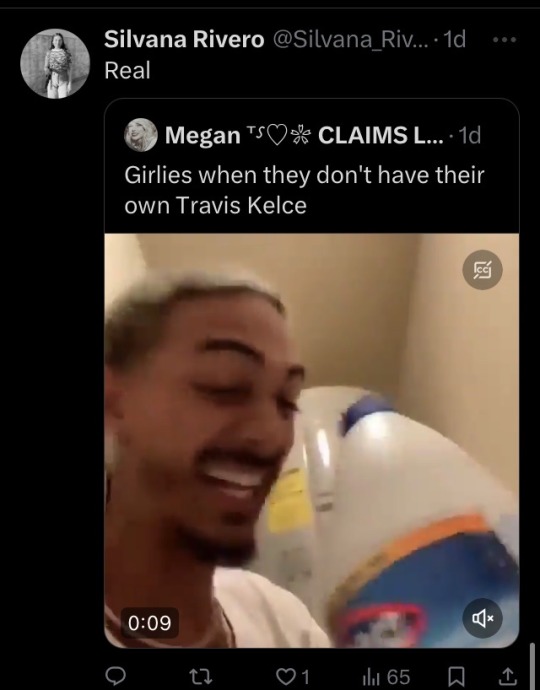
The insane dickriding of Travis Kelce continues.
Swifties are currently in the idealisation phase with Travis, wishing they had their own Travis Kelce and being pained/sad/even suicidal because they don’t.
Make no mistake, they used to say the EXACT SAME SHIT about Joe before the breakup, talking about “I want my own Joe Alwyn,” but now they all hate him and think he’s the worst man in the world and LITERALLY want him to die.
It’s the same old parasocial idealisation/devaluation cycle, wash, rinse, and repeat.
But this idealisation of Travis Kelce is incredibly disturbing, because he’s a walking red flag. And young women and girls are now glorifying men like him because of Taylor.
65 notes
·
View notes
Text

by you talking about makima being an abusive mother i assume you're referring to eli's excellent post about CSM's association with motherhood. please do check it out if you haven't, it's been rotting away in my brain for a while and the Chainsaw Man as a birthing device is something i'll bring up in this response.
this is a really intriguing line of inquiry, and an interesting way to think of kishibe; so i'll attempt to assimilate my thoughts on how he's positioned in this answer. this will be quite long so do bear with me:
i've talked about how Family as a concept bleeds into part two from part one. in p1, makima forms for denji a Family, and in p2, denji is handed this motherhood over nayuta.
makima as the Mother is kept and collared by the state. and thinking of chainsaw man in terms of its reproductive power can be extended to its literal reproduction of the narrative. myth and memory form themselves through regurgitation, and the CSM cuts away this chain of reproduction when it eats entire concepts. when it makes people forget. there's an already apparent connection to the Womb (makima // nayuta // denji) but the selectivity in narrative-reproduction is why its central to makima and kishibe's conflict. the war against the mother who exerts control over the child.
because kishibe is the Masculine: he teaches makima and in turn makima entrusts denji and power to him,,, he narratively affirms denji's wondering if he's still able to feel, whether he shouldn't feel sadder at himeno's death by telling us, the audience, that the best devil hunters are those who "have a few screws loose." we're painted this image of denji as a feral incomprehensible Crazy thing, but this isn't true even at this phase of the story. he mourns pochita, he empathises with power's grief at losing meowy. [there's an intriguing line of thought where you compare denji with aki along this vein too, if you think about it].
and that's why the movie date with makima is actually the effective closing of this arc -- her telling denji that he does have a heart subverts kishibe's rhetoric, and what the story tells us denji is. this is makima in her role as mama, the mother, the love that she feels and recieves and creates. incidentally, the chaotic agent that kishibe envisions coincides with makima's idealisation of the chainsaw man, apart from the part where she's expressedly affectionate towards it. and who has she been raised by except these (masculine) institutions? who taught her how and what to want?
aside but "that's a lie." // he sees makima and recognises her machinations at one level but he's never really understood her or her need for love. she tells him that she wants to save people (and this may or may not be true) but he can't really parse that, can he? and kishibe also structures and contextualises so much of the story for us, just like what makima does: what i already said about denji's chaotic self, him narrating reze's past, etc. he's an independent source of information.
because yeah: kishibe is ruthless. and people often bring up kishibe's relationship with quanxi but i don't often see them balance her "ignorance is bliss" vs. kishibe's need to have a few screws loose. we know as the audience about how quanxi actively shuts herself off, but kishibe keeps talking about leaning into this devil hunter nature. and what i think is decipherable from this dynamic is that quanxi, or at least what kishibe sees her as, is kishibe's ideal. tbh she's actually a Symbol for various different ideals, her habitation and display of her sexuality alongside her Ignorance is denji's ultimate form! and kishibe trains denji... [aside but this is why cosmo being her gf is so interesting to me. something something woman who thinks ignorance is bliss x devil who embodies the Horrors of Knowing]
kishibe blindfolding himself after her death is him transposing that ignorance onto himself. he doesn't want to see a thing -- and that's where you see that dissonance. it's not that he's beyond caring, it's how blind he is in how he does this caring.
and kishibe strains against this, he wants to cut away his relationships as contrasted with makima (and even denji) wanting to form them. and this is why makima cutting off kishibe's last tie to quanxi is so interesting because you remember: quanxi didn't accept his deal.
you have kishibe pining after quanxi and yet she's not sexually available to him, so he further isolates himself. and the forming and breaking of relationships comes back here so vividly --
aki's and power's deaths form the CSM out of denji. it's crazy and unpredictable but it doesn't challenge makima, does it? // "attacks don't work against her."
and when all is said and done, denji tells him it's love. loove. denji's the one who explains makima to kishibe. they're sitting at the bench and denji's petting the dogs while nyako, the willingly domesticated animal, twirls itself around kishibe... and kishibe handles the cat with such affection. denji tells him it's love so what does he do except hand nayuta to him??
thank you for the ask, anon!
#kishibe as fatherhood... kishibe as the expected masculine... father figures for denji are dead behind a closed door ->#ignorance is bliss and kishibe is his mentor...#crow.asks#csm#umm. also a fic rec but nerve ape by hassoutoby on ao3 does kishibe's character very well. please read it#csm meta#kishibe#chainsaw man#csm kishibe#makima#denji#quanxi#crow.txt
66 notes
·
View notes
Text
In response to @hislittleraincloud's post.
I've been reading fanfiction for a very long time (writing for a while now, too). I've seen it all, really. I know what fanfiction or any type of fiction is for. And I know the purpose of art. I've studied literature to a high level and now I'm studying screenwriting and film-making. I've also studied a bit of sociology and stuff. And it's thanks to these studies that I also know the responsibility that comes with releasing your work into the world and on social media.
In fanfiction, you have different scenarios. I'm sure you know them. You have those who write for others, those who self-insert because they would like to be in a certain situation, and those who just have a wild imagination and just want to put their dreams and what-ifs into words.
The thing with underage fanfiction, is that those who take requests don't know if they're writing for a sicko or not, those who self-insert may not fully understand what they are writing about (especially minors), and those who just want to create silly stuff have no idea how their work is going to be received and perceived.
I get that some teenagers fantasise about adults. They are nurturing and experienced, objects of admiration, and many young people go through celebrity crushes and stuff like that. They're finding out about sexuality. I get it. Been there, done that (you seem to have purposely forgotten to share the part where I say I have had a real relationship with a former professor, too).
But many teens lack the emotional ability to understand that such things cannot be. Actively writing those tropes, especially if self-inserting, is not helping them go through that awkward phase and grow into adulthood; most of the time, it just comforts them into a reality that cannot be and while they're focusing on that, they're not focusing on learning how to recognise certain patterns irl for their own safety. (This is not me thinking teens are dumb, this is me acknowledging the difficulties of their age and the dangers they are exposed to on social media and irl).
Now also seems a good time to remind everyone that while social media is usually forbidden under the age of 13 (which is incredibly young, even though you think you're ready to see the world at that age), some kids lie about their age to get onto platforms they really shouldn't be on.
Now, on adult writers. Those are supposed to know the dichotomy between fiction and reality, between morally right and wrong, healthy and unhealthy, etc. But not all of them do. Writing fanfiction is about fantasies (maybe, not always), but if somebody's fantasies are, deep down, having relationships with a minor or seeing an adult have relationships with a minor, there is a huge problem. And it's not enough for those people to say "Oh, but I know it's wrong. I'd never do it irl." Hopefully you'll indeed never cross that line. But you still have those fantasies and it's not normal at all.
And if you actually don't have those fantasies but just want to write about those topics for "fun" and to explore taboo dynamics, then at least:
- Know/Remember that your work may comfort some sickos' fantasies
- Write about those dynamics properly, maybe? Show conflict in the characters' minds, acknowledge you're working with taboo dynamics, that they are abnormal irl, find subtle ways to let your readership know that you're aware that this is wrong and that you do not personally agree or engage with those practices (it'll not only make your writing more impactful and entertaining to read, but it'll also put much needed boundaries between your author persona and your irl personality). There is also a huge difference between writing about taboo dynamics and romanticising or idealising taboo dynamics. There is a difference between exploring the reality of human sexuality for literary purposes and glorifying what qualifies as mental illness. Just because it exists in the real world doesn't make it right or natural.
- Tag your fanfics properly and use trigger warnings. Also, preferably tick the option to hide your work to underage people (especially if you want to skip the previous point and basically aim at writing disgusting things or morally wrong stuff on purpose). Tags and TW are needed for people who filter the content they see so your work doesn't get to the wrong audience and cause harm.
Because the thing is writing fanfiction is not like other arts. First of all, many if not most people don't write fanfiction with the intent of making art so we could argue it isn't relevant to invoke "artistic freedom" like you did at all. But mostly, fanfiction is meant to be read online and shared on social media. This is not like publishing a book that you know will be published by the best editing house, showcased in the most appropriate setting to the most relevant audience, people who will be able to conscientiously choose whether to go or not, without you having to do anything. We are in a setting where everything can be shown to everyone, where minors (who often like to think of themselves as mature and adults already) are exposed to a myriad of things they're not supposed to see. Some might be educated on the dangers of Internet but choose not to listen to their parents (because they're precisely teens), or some might have parents who never taught them. Either way, most of the time the parents aren't here to regulate.
So I feel it is our responsibility as adult content creators to be careful. It doesn't cost anything to put TW, to tag properly and make sure our work doesn't show to potential fragile and/or emotionally immature people. In fact, it simply makes us good people. And if you tell me you don't care about being a good person... yikes.
On that, I'd like to add that being virulent, vulgar, and over-arrogant doesn't make you sound cool or self-confident. It doesn't actually show you don't care about people's opinions either. Because those who truly don't care about others don't need to make statements about it. They keep quiet and do their stuff in their own space. They don't even respond to critics, they don't feel attacked. And being the loudest in a room doesn't make you right, it makes you sound like an emotionally immature, insecure, uneducated person with no humanity at all but an intellectual deficiency instead. So instead of yapping, you could have either tagged me and have a civilised conversation to show proof of intelligence and defend your point, or kept living your life the way you always intended –thus showing you indeed do not care about me and my opinion.
Also know that you are, in fact, not protected by your username and profile picture. Everything is traceable. I wouldn't advise acting like a dickhead on social media because you never know where you may want to work or whom you may need to work for/with. That's just some advice, which you can take as condescending or not, whatever (it isn't, just for the tone indicator). But I know some people tend to forget social media isn't a security blanket. I personally wouldn't want my future employer, a member of my family, friends or whatever to find out I'm actually a huge arsehole when I think I'm not being watched...
And if all I've said doesn't resonate with who you are, then why the heck did you take my post so personally? This was clearly about the myriad of people who romanticise grooming, pedophilia, child pornography, etc. This was about the people who think it's sexy, arousing, to write/read about a minor and an adult in shameless smut situations. If you think that minor/adult relationships are sexy, then you do have a problem (not my opinion, it's not purity culture or being vanilla, it's psychiatry). If you think it's human nature and regular attraction to want to fuck a child or a dead body or idk what other trope, that's a serious issue. Keep doing what you're doing if you want, but have the decency to shut up when your flaws are being pointed out. If that's not you, then once again: why acting so disrespectful? Scroll away?
But for real, let me repeat this (if not for you, then for any concerned people out there): it's normal to have a crush on a teacher or a figure of authority and be all dreamy about it when growing up and discovering one's sexuality. It's not okay to actively wish for this kind of relationship irl or try to make it happen. Having a relationship with a teacher, especially when still a student, especially when being a minor is not sexy or fun. It's dangerous in so many ways.
7 notes
·
View notes
Text


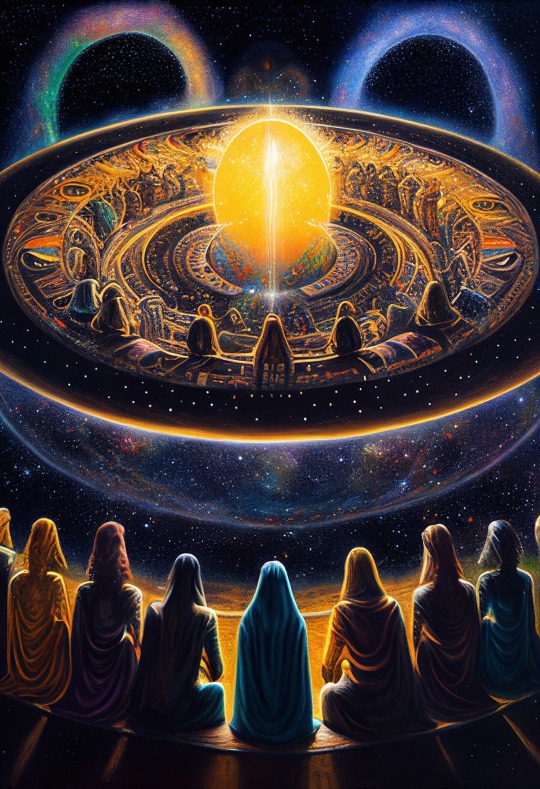

The Galactic High Council 🛸 To The Ascension LightWorker Collective:
As you navigate through transitions activating change, endings, and new beginnings, know that you are now equipped with healing and insights that empower you to move through this phase effortlessly. Prepare to witness the unveiling of mysteries and illusions, representing a major global awakening drawing us much closer into the frequency of divine light.
Embrace the newly activated energies pulsating through you, igniting a profound connection to your soul's purpose and beckoning you to honour your true essence. A deep-seated urge to align with your authentic self will guide you towards significant lifestyle shifts and healthier ways to express and release emotions, transcending impulsive reactions.
During this transformative new earth stage karmic cycles and patterns are undergoing drastic shifts or completions. Past life, family, and childhood karmic wounds may also resurface, presenting you with many opportunities to fully release and heal. the profound healing energies that surround you now are supporting ascending individuals to navigate through this phase of intense personal and spiritual development .
Eclipses are a profound cosmic phenomena, That hold immense significance in astrological and spiritual realms. Reminding all ascending that everything is occuring for the highest good of self and all . These celestial occurrences stand as the pinnacle of annual transits, acting as portals to higher dimensions.
Their divine purpose is to create a higher vibrational energetic space that accelerates cosmic recalibration and destined metamorphosis. In their essence, eclipses also catalyse the unfolding of fateful events, bringing in a surge of higher energy that brings in profound shifts in the fabric of our existence.
This next Eclipse on the 25th of March represents a significant juncture in time, where the universe will orchestrate many unexpected events and opportunities, compelling swift decision-making and serving as a catalyst for profound change. Within their cosmic realms this next eclipse will serve to clear and intertwine timelines, harmonising past, present, and future to propel ascending individuals and the collective towards a new paradigm of authentic being.
Through their disruptive yet enlightening influence, the next 2 eclipses will guide many Ascending towards a much higher state of Conscious awareness and being, beckoning all of us to embrace the transformational power of these celestial forces now at play .
In this new ascension season and chapter the focus shifts towards connecting with genuine souls on a path of true healing and authenticity. Whether in business partnerships, friendships, or relationships, the emphasis is on aligning with individuals dedicated to their inner growth work emotional maturity, and pursuing their divine purpose.
This next stage of the journey transcends mere surface-level connections, it is about finding others who aspire to authentically Ascend and are committed to their personal evolution.
Gone are the days of seeking external validation or striving to embody an idealised image of how success should look like , Instead, the focus now lays in developing genuine connections based in vibrational alignment, authenticity, commitment, and loyalty. Recognising your inherent worth and value and the depth of your reflected inner work, Many ascending are now raising their standards and surrounding the self with those who resonate with the soul's journey.
Commonly reported Starseed Ascension Symptoms have included flu-like symptoms, waves of nausea, third eye pressure, headaches, body aches, dizziness, digestive issues difficulty balancing, extreme fatigue, sleep disturbances, heightened emotions, dull headaches, accelerated dehydration, and back/kidney pains, as well as continued third eye pressure and sinus issues. It is advised to prioritise self-care during this process.
Embracing this transformative shift means stepping into a space where mediocrity has no place, and the pursuit of exceptional connections becomes non-negotiable. By upholding these higher standards in self , you are able to create a fertile ground for enhanced consciousness , mutual support, and a collective shared purpose, connecting with those that nourish the elevating spirit to elevate the collective consciousness.
Starseed activations are now unfolding at a rapid and an unprecedented pace, catalysing a new era unlike anything witnessed in our solar system. The Love Revolution of New Earth is taking shape as we collectively embrace living from the heart space with increasing ease and grace. Within our Family of Light, a shared consciousness is emerging, paving the way for a collective shift towards multidimensional existence.
As Starseeds awaken to their true essence and purpose, they are aligning with the energies they were destined to embody. It is a moment in time where each ascending individual is called to come online to fully embrace their unique gifts and purpose . The threads of connection among Starseeds are weaving a tapestry of unity and higher awareness, propelling us towards a reality where multidimensional living is not only possible but absolutely inevitable.
This cosmic awakening marks a pivotal juncture in our evolution, as we stand on the threshold of a brand new earth paradigm one characterised by unity, unconditional love, and expanded consciousness. Embrace this moment, for it is your time to shine Starseed , to contribute your expanding light to the collective experience of planetary and cosmic evolution.
Eclipses have the power to unveil what is out of alignment and in need of change, revealing truths through revelations. While they may introduce chaotic energy and unexpected events, eclipses will always offer significant opportunities for deeper healing, clearing old energies, clearing stagnation to start afresh and anew. Physical changes during and after eclipses will accelerate personal transformation, marking the end of one cycle and the beginning of a new one.
In loving and dedicated Ascension service
27 notes
·
View notes
Text
entropy and life//entropy and death
This is a discussion that spun out of a post on web novel The Flower That Bloomed Nowhere. However, it's mostly a chance to lay out the entropy thing. So most of it is not Flower related at all...
the thermodynamics lesson
Entropy is one of those subjects that tends to be described quite vaguely. The rigorous definition, on the other hand, is packed full of jargon like 'macrostates', which I found pretty hard to wrap my head around as a university student back in the day. So let's begin this post with an attempt to lay it out a bit more intuitively.
In the early days of thermodynamics, as 19th-century scientists like Clausius attempted to get to grips with 'how do you build a better steam engine', entropy was a rather mysterious quantity that emerged from their networks of differential equations. It was defined in relation to measurable quantities temperature and heat. If you add heat to a system at a given temperature, its entropy goes up. In an idealised reversible process, like compressing a piston infinitely slowly, the entropy stays constant.
Strangely, this convenient quantity always seemed to go up or stay the same, never ever down. This was so strictly true that it was declared to be a 'law of thermodynamics'. Why the hell should that be true? Turns out they'd accidentally stumbled on one of the most fundamental principles of the universe.
So. What actually is it? When we talk about entropy, we are talking about a system that can be described in two related ways: a 'nitty-gritty details' one that's exhaustively precise, and a 'broad strokes' one that brushes over most of those details. (The jargon calls the first one a 'microstate' and the second one a 'macrostate'.)
For example, say the thing you're trying to describe is a gas. The 'nitty gritty details' description would describe the position and velocity of every single molecule zipping around in that gas. The 'broad strokes' description would sum it all up with a few quantities such as temperature, volume and pressure, which describe how much energy and momentum the molecules have on average, and the places they might be.
In general there are many different possible ways you could arrange the molecules and their kinetic energy match up with that broad-strokes description.
In statistical mechanics, entropy describes the relationship between the two. It measures the number of possible 'nitty gritty details' descriptions that match up with the 'broad strokes' description.
In short, entropy could be thought of as a measure of what is not known or indeed knowable. It is sort of like a measure of 'disorder', but it's a very specific sense of 'disorder'.
For another example, let's say that you are running along with two folders. Each folder contains 100 pages, and one of them is important to you. You know for sure it's in the left folder. But then you suffer a comical anime collision that leads to your papers going all over the floor! You pick them up and stuff them randomly back in the folders.
In the first state, the macrostate is 'the important page is in the left folder'. There are 100 positions it could be. After your accident, you don't know which folder has that page. The macrostate is 'It could be in either folder'. So there are now 200 positions it could be. This means your papers are now in a higher entropy state than they were before.
In general, if you start out a system in a given 'broad strokes' state, it will randomly explore all the different 'nitty gritty details' states available in its phase space (this is called the ergodic hypothesis). The more 'nitty gritty details' states that are associated with a given 'broad strokes' state, the more likely that it will end up in that state. In practice, once you have realistic numbers of particles involved, the probabilities involved are so extreme that we can say that the system will almost certainly end up in a 'broad strokes' state with equal or higher entropy. This is called the Second Law of Thermodynamics: it says entropy will always stay the same, or increase.
This is the modern, statistical view of entropy developed by Ludwig Boltzmann in the 1870s and really nailed down at the start of the 20th century, summed up by the famous formula S=k log W. This was such a big deal that they engraved it on his tombstone.
Since the Second Law of Thermodynamics is statistical in nature, it applies anywhere its assumptions hold, regardless of how the underlying physics works. This makes it astonishingly powerful. Before long, the idea of entropy in thermodynamics inspired other, related ideas. Claude Shannon used the word entropy for a measure of the maximum information conveyed in a message of a certain length.
the life of energy and entropy
So, everything is made of energy, and that energy is in a state with a certain amount of thermodynamic entropy. As we just discussed, every chemical process must globally increase the entropy. If the entropy of one thing goes down, the entropy of something else must increase by an equal or greater amount.
(A little caveat: traditional thermodynamics was mainly concerned with systems in equilibrium. Life is almost by definition not in thermodynamic equilibrium, which makes things generally a lot more complicated. Luckily I'm going to talk about things at such a high level of abstraction that it won't matter.)
There are generally speaking two ways to increase entropy. You can add more energy to the system, and you can take the existing energy and distribute it more evenly.
For example, a fridge in a warm room is in a low entropy state. Left to its own devices, energy from outside would make its way into the fridge, lowering the temperature of the outside slightly and increasing the temperature of the inside. This would increase the entropy: there are more ways for the energy to be distributed when the inside of the fridge is warmer.
To cool the fridge we want to move some energy back to the outside. But that would lower entropy, which is a no-no! To get around this, the heat pump on a fridge must always add a bit of extra energy to the outside of the fridge. In this way it's possible to link the cooling of the inside of the fridge to the increase in entropy outside, and the whole process becomes thermodynamically viable.
Likewise, for a coherent pattern such as life to exist, it must slot itself into the constant transition from low to high entropy in a way that can dump the excess entropy it adds somewhere else.
Fortunately, we live on a planet that is orbiting a bright star, and also radiating heat into space. The sun provides energy in a relatively low-entropy state: highly directional, in a certain limited range of frequencies. The electromagnetic radiation leaving our planet is in a higher entropy state. The earth as a whole is pretty near equilibrium (although it's presently warming, as you might have heard).
Using a multistep process and suitable enzymes, photosynthesis can convert a portion of the incoming sunlight energy into sugars, which are in a tasty low entropy state. This is a highly unfavoured process in general, and it requires some shenanigans to get away with it. But basically, the compensating increase in entropy is achieved by heating up the surroundings, which radiate away lower-temperature infrared radiation.
the reason we don't live forever
Nearly all other lifeforms depend on these helpfully packaged low-entropy molecules. We take in molecules from outside by breathing in and eating and drinking, put them through a bunch of chemical reactions (respiration and so forth), and emit molecules at a higher entropy (breathing out, pissing, shitting, etc.). Since we constantly have to throw away molecules to get rid of the excess entropy produced by the processes of living, we constantly have to eat more food. This is what I was alluding to in the Dungeon Meshi post from the other day.
That's the short-timescale battle against entropy. On longer timescales, we can more vaguely say that life depends on the ability to preserve a low-entropy, non-equilibrium state. On the simplest level, a human body is in a very low entropy state compared to a cloud of carbon dioxide and water, but we generally speaking do not spontaneously combust because there is a high enough energy barrier in the way. But in a more abstract one, our cells continue to function in specialised roles, the complex networks of reaction pathways continue to tick over, and the whole machine somehow keeps working.
However, the longer you try to maintain a pattern, the more low-probability problems start to become statistical inevitabilities.
For example, cells contain a whole mess of chemical reactions which can gradually accumulate errors, waste products etc. which can corrupt their functioning. To compensate for this, multicellular organisms are constantly rebuilding themselves. On the one hand, their cells divide to create new cells; on the other, stressed cells undergo apoptosis, i.e. die. However, sometimes cells become corrupt in a way that causes them to fail to die when instructed. Our body has an entire complicated apparatus designed to detect those cells and destroy them before they start replicating uncontrollably. Our various defensive mechanisms detect and destroy the vast majority of potentially cancerous cells... but over a long enough period, the odds are not in our favour. Every cell has a tiny potential to become cancerous.
At this point we're really not in the realm of rigorous thermodynamic entropy calculations. However, we can think of 'dead body' as generally speaking a higher-entropy set of states than 'living creature'. There are many more ways for the atoms that make us up to be arranged as a dead person, cloud of gas, etc. than an alive person. Worse still should we find we were in a metastable state, where only a small boost over the energy barrier is needed to cause a runaway reaction that drops us into a lower energy, higher entropy state.
In a sense, a viral infection could be thought of as a collapse of a metastable pattern. The replication machinery in our cells could produce human cells but it can equally produce viruses, and it turns out stamping out viruses is (in this loose sense) a higher entropy pattern; the main thing that stops us from turning into a pile of viruses is the absence of a virus to kick the process off.
So sooner or later, we inevitably(?) hit a level of disruption which causes a cascading failure in all these interlinked biological systems. The pattern collapses.
This is what we call 'death'.
an analogy
If you're familiar with cellular automata like Conway's Game of Life, you'll know it's possible to construct incredibly elaborate persistent patterns. You can even build the game of life in the game of life. But these systems can be quite brittle: if you scribble a little on the board, the coherent pattern will break and it will collapse back into a random mess of oscillators. 'Random mess of oscillators' is a high-entropy state for the Game of Life: there are many many different board states that correspond to it. 'Board that plays the Game of Life' is a low-entropy state: there are a scant few states that fit.
The ergodic hypothesis does not apply to the Game of Life. Without manual intervention, the 'game of life in game of life' board would keep simulating a giant version of the game of life indefinitely. However...
For physical computer systems, a vaguely similar process of accumulating problems can occur. For example, a program with a memory leak will gradually request more and more memory from the operating system, leaving more and more memory in an inaccessible state. Other programs may end up running slowly, starved of resources.
In general, there are a great many ways a computer can go wrong, and few that represent it going right.
One of the ways our body avoids collapsing like this is by dedicating resources to cells whose job is to monitor the other cells and intervene if they show heuristic signs of screwing up. This is the evolutionary arms race between immune system and virus. The same can be true on computers, which also support 'viruses' in the form of programs that are able to hijack a computer and replicate themselves onto other computers - and one of our solutions is similar, writing programs which detect and terminate programs which have the appearance of viruses.
When a computer is running slowly, the first thing to do is to reboot it. This will reload all the programs from the unchanging version on disc.
The animal body's version of a reboot is to dump all the accumulated decay onto a corpse and produce a whole new organism from a single pair of cells. This is one function of reproduction, a chance to wipe the slate clean. (One thing I remain curious about is how the body keeps the gamete cells in good shape.)
but what if we did live forever?
I am not particularly up to date on senescence research, but in general the theories do appear to go along broad lines of 'accumulating damage', with disagreement over what represents the most fundamental cause.
Here's how Su discusses the problem of living indefinitely in The Flower That Blooms Nowhere, chapter 2:
The trouble, however, is that the longer you try to preserve a system well into a length of time it is utterly not designed (well, evolved, in this case) for, the more strange and complicated problems appear. Take cancer, humanity’s oldest companion. For a young person with a body that's still running according to program, it's an easy problem to solve. Stick a scepter in their business, cast the Life-Slaying Arcana with the 'cancerous' addendum script – which identifies and eliminates around the 10,000 most common types of defective cell – and that's all it takes. No problem! A monkey could do it. But the body isn’t a thing unto itself, a inherently stable entity that just gets worn down or sometimes infected with nasty things. And cancer cells aren’t just malevolent little sprites that hop out of the netherworld. They’re one of innumerable quasi-autonomous components that are themselves important to the survival of the body, but just happen to be doing their job slightly wrong. So even the act of killing them causes disruption. Maybe not major disruption, but disruption all the same. Which will cause little stressors on other components, which in turn might cause them to become cancerous, maybe in a more 'interesting' way that’s a little harder to detect. And if you stop that... Or hell, forget even cancer. Cells mutate all the time just by nature, the anima script becoming warped slightly in the process of division. Most of the time, it's harmless; so long as you stay up to date with your telomere extensions, most dysfunctional cells don't present serious problems and can be easily killed off by your immune system. But live long enough, and by sheer mathematics, you'll get a mutation that isn't. And if you live a really long time, you'll get a lot of them, and unless you can detect them perfectly, they'll build up, with, again, interesting results. At a deep enough level, the problem wasn't biology. It was physics. Entropy.
A few quirks of the setting emerge here. Rather than DNA we have 'the anima script'. It remains to be seen if this is just another name for DNA or reflecting some fundamental alt-biology that runs on magic or some shit. Others reflect real biology: 'telomeres' are a region at the end of the DNA strands in chromosomes. They serve as a kind of ablative shield, protecting the end of the DNA during replication. The loss of the telomeres have been touted as a major factor in the aging process.
A few chapters later we encounter a man who does not think of himself as really being the same person as he was a hundred years ago. Which, mood - I don't think I'm really the same person I was ten years ago. Or five. Or hell, even one.
The problem with really long-term scifi life extension ends up being a kind of signal-vs-noise problem. Humans change, a lot, as our lives advance. Hell, life is a process of constant change. We accumulate experiences and memories, learn new things, build new connections, change our opinions. Mostly this is desirable. Even if you had a perfect down-to-the-nucleon recording of the state of a person at a given point in time, overwriting a person with that state many years later would amount to killing them and replacing them with their old self. So the problem becomes distinguishing the good, wanted changes ('character development', even if contrary to what you wanted in the past) from the bad unwanted changes (cancer or whatever).
But then it gets squirly. Memories are physical too. If you experienced a deeply traumatic event, and learned a set of unwanted behaviours and associations that will shit up your quality of life, maybe you'd want to erase that trauma and forget or rewrite that memory. But if you're gonna do that... do you start rewriting all your memories? Does space become limited at some point? Can you back up your memories? What do you choose to preserve, and what do you choose to delete?
Living forever means forgetting infinitely many things, and Ship-of-Theseusing yourself into infinitely many people... perhaps infinitely many times each. Instead of death being sudden and taking place at a particular moment in time, it's a gradual transition into something that becomes unrecognisable from the point of view of your present self. I don't think there's any coherent self-narrative that can hold up in the face of infinity.
That's still probably better than dying I guess! But it is perhaps unsettling, in the same way that it's unsettling to realise that whether or not Everett quantum mechanics is true, and if there is a finite amount information in the observable universe, an infinite universe must contain infinite exact copies of that observable universe, and infinite near variations, and basically you end up with many-worlds through the back door. Unless the universe is finite or something.
Anyway, living forever probably isn't on the cards for us. Honestly I think we'll be lucky if complex global societies make it through the next century. 'Making it' in the really long term is going to require an unprecedented megaproject of effort to effect a complete renewable transition and reorganise society to a steady state economy which, just like life, takes in only low-entropy energy and puts out high-entropy energy in the form of photons, with all the other materials - minerals etc. - circulating in a closed loop. That probably won't happen but idk, never say never.
Looking forward to how this book plays with all this stuff.
#fiction#sff#web serials#entropy#physics#biology#thermodynamics#the flower that bloomed nowhere#ok that's all i have to say about the first twelve chapters lmaooo
32 notes
·
View notes
Text
Had a uni assignment to use Freud to analyse any piece of media of my choosing... I did it with Dead Ringers (1988) and Crimes of the Future (2022) and particularly liked my conclusions about the latter, so I'll share it here!
wonder what @cronennerd will think
"(...) This happiness of intrauterine life, as well as the regression which the twins undergo, are connected to the idea of the death drive, which determines the desire to preserve the body by always returning to a previous state of balance, which would have existed in the womb, or even before conception, and which will only be truly recovered after death. It is the fundamental desire to become inorganic, and it is also an impulse that can be realised in the sexual act, the orgasm being that moment of destruction of the Self. Here, we must consider Crimes of the Future to better understand the Cronenbergian conception of the death drive. In Cronenberg's films, the Self constantly tries to destroy itself, often seeking this in acts of sexual perversion (in the Freudian sense of any act other than heterosexual penetration for reproductive purposes). Claire, with her sadomasochistic tendencies and insistence that she must always be humiliated, represents this quest, while for the twins this is a quest that exists beyond the sexual sphere. In general, Cronenberg's films support an idea that sex is just one facet of the death drive, and explore other ways in which it can be demonstrated. This is why I don't like to read the scene in which Beverly performs surgery on Elliot as a symbol of homosexual penetration, just as in Crimes of the Future all the penetrations that occur during the film should not be read as equivalent to genital sexual activity. What Cronenberg seeks to demonstrate is something that goes beyond what we have learned should be the height of intimacy and jouissance, whether in the union of identical twins inside the womb or in the exponentiation of skin, muscles and organs as utmost erogenous zones. As Crimes of the Future reiterates, "surgery is the new sex˜. About the bioport in eXistenZ (1999), Teresa de Lauretis says, “it is not a metaphor, but a substitute, indicating a new sexual economy of the human body”. The same is true here, and there is even a moment when Saul refuses to engage in the “old sex”.
After all, the climax of pleasure in Crimes of the Future is in the least obviously erotic act of all, though with a high libidinal charge, eating. This climax is possible due to Saul's personal context of acceptance of his body as flesh, independent of any mental process of his, whether conscious or unconscious, following rules of nature that, while promising salvation for humanity, are also the realisation of becoming inorganic, now that plastic can be digested. The ecstasy is such that a parallel is created with The Passion of Joan of Arc, the Saint's expression being burned at the stake, in such a way that the ingestion of plastic becomes comparable to death, abandonment by everyone, faith, and promise of resurrection with God. And it is not the plastic itself that causes this, but the significance that this moment gains for Saul, in a way that proves Freud's idea that sexuality, libido, are not a biological function of the body, but a product of fantasy. Throughout the film, suffering immensely whenever he eats, constantly weakened, Saul is like a baby who lives between the real experience of feeding and the idealisation of when this filling will occur again, which is what in the oral phase makes the breast becomes a point of fixation whose loss, during weaning, is traumatising. In Saul's case, the idealisation of the moment when he will feel satisfied is constant, but he finds only suffering in reality. It's as if he was experiencing the trauma of weaning without knowing it and, when consuming plastic, he found his mother's breast again, returning to the comfort we all long for, once again being that baby in a state of completeness with its mother. Just as the martyr's death is seen as a return home, the final nostos, Saul too, at this moment, returns home. And of course, because this return is being associated with a new object, it is characterised as a life-creating development, and not as a destructive regression, even if (or especially because) its pleasure is based on the destruction of the Self.
Thus, David Cronenberg's journey from Dead Ringers to Crimes of the Future demonstrates a change in perspective on certain fundamental issues. In a lecture this semester on the figure of the devil in Fernando Pessoa, professor Roberta Ferraz brought up the fact that, as he exists only in the field of fantasy, Fernando Pessoa's devil cannot inflict pain, so that everything related to it passes from the field of morality onto the field of aesthetics. This leap of creative freedom is taken by Cronenberg in Crimes of the Future, allowing himself to represent sadomasochistic impulses within an aesthetic dimension, without them carrying a weight of moral corruption, humiliation and waste of life, as occurs in his other films. The real crime of the future is the manipulation of a boy's corpse by a bureaucratic body, to hide the reality of people already being born with a digestive system adapted to plastic. The horror lies not only in the aesthetic corruption of the boy's body, but especially in how his body is used by foreign vehicles without him having any say. The issues of consent and autonomy to do what you want with your own body come to the fore, contrasting with the way the Mantle brothers deal with their patients' bodies. The main change in perspective, however, occurs in relation to the death drive and its clash between the organic and the inorganic. Where before the death drive was only destructive, now it is also life-creating. Where before there was the horror of our carnal condition, doomed to eternal lament for the loss of non-existence, its physical barrier that makes the much-desired immersion in the Other destructive, now there is love for the flesh, for the pleasures it provides us, and a tempting play with the idea that to become (consume) inorganic will be the salvation of our species."
19 notes
·
View notes
Text
So I am reading this novel about Naps and Josephine's story and his passion has already worn out in Italy, so his whole great love for here is also over by consequence. An idea is worth loving, not a human woman. He's already ogling Giuseppina Grassini. (Btw funny how his first serious mistress's name was the same he gave to his wife).
I'm bothered when they come to picture this as the ending of all Napoleon's love for Josephine. Mostly in fiction, but even non-fiction tends to give this interpretation of their dynamic, sometimes already during the Italian campaign.
(I should point that this is an old novel, though.)
Why should any feeling of love go away once most passion and enthusiasm is over? The "mio dolce amor" period seems to me as just one phase of a much more complex relationship. I'd rather see it like Napoleon matured out of an excessive enthusiasm, stopped idealising her wife and gave her a more balanced vision and sentiment. He certainly had to do this after facing her faults, maybe also suffering while doing so, but should that not be love too?
He must have stopped worshipping a divinity and begun comprehending a woman, and that should be framed more as a positive thing, not as a delusion.
#Oh hey that's me rambling about Napoleon and Josephine#How new#Well that's the reason I called myself napology down here#Hashtags beginning with Capital letters#napoleon bonaparte#Napoleon Bonaparte#Josephine Bonaparte#Napoleon and Josephine#Passion is not the only face of love#It should be normal but it's not stretched out enough#End of the rant bye#Love#Passion#In the end I use them and their story to think about problems and topics in real life#i like translating topics like that#For me it's the final sense to give to everything
44 notes
·
View notes
Text
DISCLAIMER
As you may have noticed, to say I like Harry Potter would be an understatement. I’ve loved the saga since I was a little kid, before the movies existed. My love for the Harry Potter saga is one of the first feelings I can remember experiencing. A feeling such as that can’t be easily forgotten, even when you grow up and realise you idealised a story with massive plot holes and a writer who’s a dickhead.
ABOUT ME
He/She/They/It, I accept everything.
20ish.
Slytherin.
Very queer.
Autistic and very, very proud of it.
In love with Severus Snape in an unhealthy way since before I knew he was one of the good guys.
In love with Alan Rickman since before I even watched the Harry Potter movies.
I understand that Severus is not perfect. He made mistakes that can be considered unforgivable. I understand he did act in a toxic and unhealthy way. I still would [REDACTED]. Moreover, those are the reasons why I love him.
Deeply disappointed with jkr. Her behaviour hurts me up to the point I prefer not to speak about it and pretend she doesn’t exist at all (I’ll never leave the denial phase). Harry Potter wrote itself.
If I write in a way that sounds too specific and weirdly articulate or if I make grammatical errors, please consider that English isn’t my first language and that mine is way more complex.
I might get unhinged sometimes. Some other times, I might be a bitch. The fun comes when both those things happen simultaneously.
This is not my main blog, and I do not intend to share my main one here.
DNI
Terfs
Transphobes
Homophobes
Conservatives in general
16 notes
·
View notes
Note
Mind analysing your poem a little? 👀
Incredibly long post alert to anyone who plans on reading this
Obligatory transphobes and terfs dni. The following poem is about and written by ‘them gotdamn trannys and queers’ and is about beautiful beautiful t4t sex
i am kissing you. on the mouth.
thank you so much for sending this in i genuinely love talking about my poetry so much muah muah muah!!!
Original poem if anyone wants to read it:
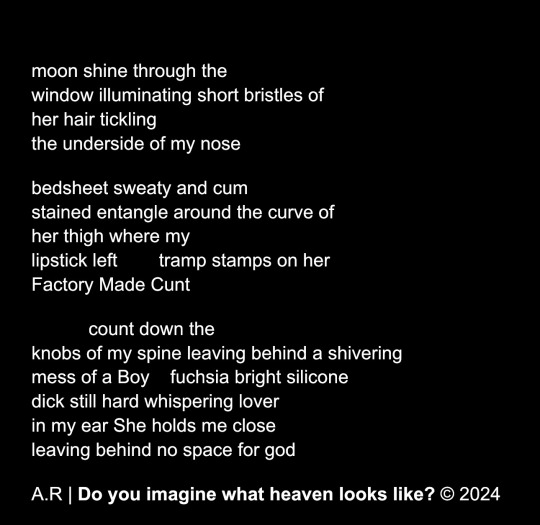
Anyway.
Welcome to Prof A. 's line by line analysis of his poem*. So buckle your seatbelts because this is gonna be loooong ride. Let's get started!
*Disclaimer: you might interpret some of these lines differently then i do and that is perfectly alright. poetry depends on everyone's own lived experience and that does not make any one interpretation less valid. i might have written the poem, but your interpretations are still just as true.
I'm going to start with inspirations and the title first because i love providing backstory and talking about other poets. Very specifically one poet that inspired me to write this actually. You can skip this part if you just want to know about the technical structures and literary devices and specific meanings behind the poem
The title was originally part of a completely different short story/prose poetry (i hadn't made up my mind yet) thing i was going to write but then never got around to finishing. but i just so happened to be going through my old writing (always keep a handy little notebook on hand. it has saved my life so many times) and find the little snippet i wrote and go, 'wait i actually like this very much' and decide to reuse it for something else.
but anyway, couple hours later im doing a voice of country thing for my literature class and analysing poetry by indigenous and aboriginal Australian poets. and i come across this little poem called 'a portrait of a genderkweer on fire' by a certain Ellen van Neerven (who belongs to the Mununjali Yugambeh people of south east Queensland btw) (go check out their poetry it is genuinely life changing) and it sticks with me you know. it really does. poc trans people writing about their lived experiences as poetry? why didn't I, a poc trans person, think about that!
(no seriously, in all my years of writing poetry it for some reason never occured to me to write about my people. so genuinely thank you Ellen for that!)
now i've already got a first line ive been wanting to use, i am feeling extremely queer and angry because of unrelated transphobia a friend faced and i have a mechanical pencil and notebook in hand.
So i start writing.
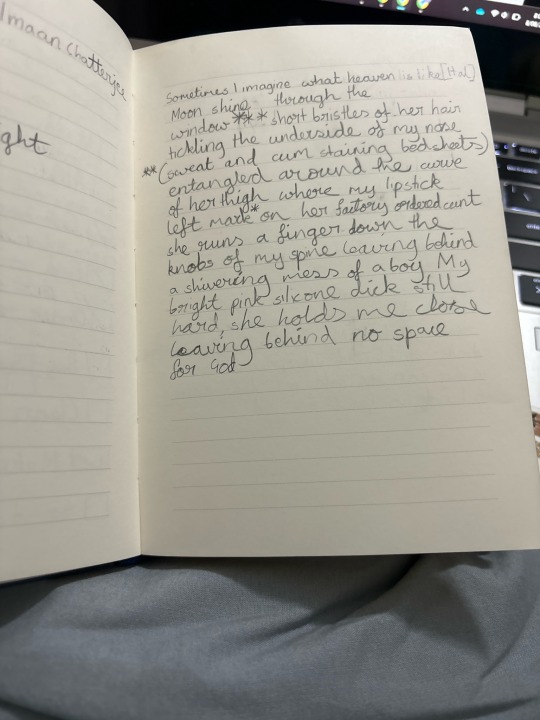
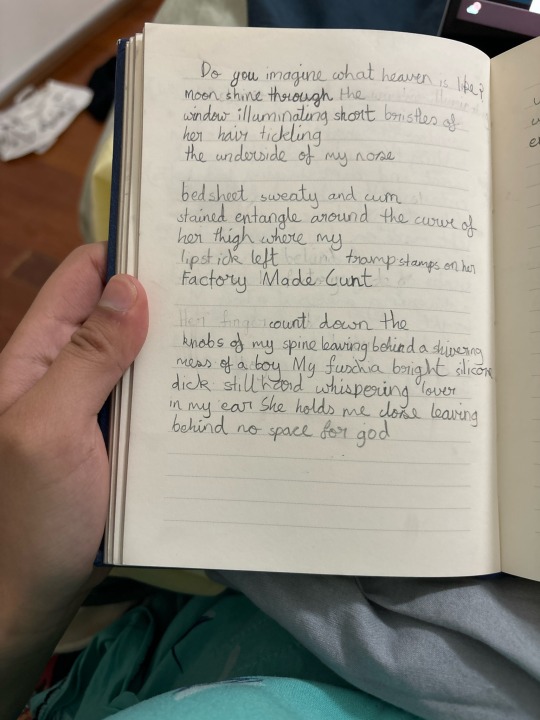
(Apologies for my awful handwriting. i was writing while pacing and waiting for the bus)
Alright, kiddies. As you can see, most of the poem was taken verbatim with very few changes to the actual word choices behind the poem. (I will be doing a deep dive into the language as well, dont you worry)
The biggest change made actually is the switch from prose poetry to a more traditional stanza poem. i made the decision to do this actually because originally the poem was meant to be much longer and incorporate the original piece i decided to rework this into.
The quote 'sometimes i imagine what heaven is like' was meant to be repeated at the start of different stanzas which would be written in prose form, each detailing a different phase of queer love in secret, from secret night time affairs (this specific poem) to escape and loving loudly (the original thing i wrote). however, it didn't really work the way i wanted it too and i decided this was fine as it was and started to edit and play around with it a bit.
i changed 'sometime i imagine what heaven is like' to 'Do you imagine what heaven looks like?' and made it the title of the poem instead of the first sentence. the poem itself now becomes the narrator's idealised image of what heaven would be like for them. i go a bit more on depth about this in point 3 of Changes to the structure
Changes to the structure
As mentioned, the first change was from prose to stanzas. I'm about to get full on literature student about this so bear with me
Each stanza has one (1) extra line from the previous one in the poem. For ex: stanza 1 has 4 lines, stanza 2 has 5 lines, and stanza 3 has 6 lines. this was a deliberate choice i made. not to be too english teacher about this but it shows the narrator is coming to some sort of a revelation soon. (i wont spoil too much about this tho. for reasons)
ENJAMBMENTS!!! if you don't know what an enjambment is, it refers to a line break that interrupts the flow of a sentence: usually the line usually doesn’t end with punctuation, and the thought continues on the next line. now, i heavily fuck with enjambments in poetry. which is why i was so eager to use them over here. they represent a kind of stream of consciences here rather than structured thought. enjamments also help in rising tension and drawing the reader in deeper, making them want to continue reading to find out what happens next.
syntax: now the poem is actually meant to be wish fulfilment of sorts for the narrator, where they imagine all the things they wish they could do with their lover. that's why its not written in present tense using sentences like 'the moon shines' or 'the bedsheet are sweaty...'. The narrator is basically telling the moon to shine through his windows and the bedsheets to be stained and his lover to run a finger down his spine. we don't actually have anything written in present tense till 'She holds me close...'
the random spaced out/missing words a.k.a SYNTAX 2.0! because yes. there are certain words missing. ive intentionally left a space between 'left' and 'tramp' and between 'Boy' and 'fuchsia'. there is also a missing word before 'count'. now, if you read my original version of the poem, you can find out what words are actually supposed to be there, but when i put it into verse form, i found that many of the words id written in prose didnt actually fit. but without them the sentence kind of fell apart. so i decided to leave blank space where those words were supposed to go to signal to the reader that something is missing while not actually needing to mention that
4.5. just like the stanzas growing by a single line in each verse, the missing words also increase in a frequency of one (1), zero of them in stanza 1, a single missing word in stanza 2 and 2 of them in stanza 3.
5. capitalisations and Punctuations to immerse the reader more and help with the stream of consciousness style of the poem, most of the poem is written in lowercase with no punctuation being used throughout the only things capitalised are 'Factory Made Cunt', '... Boy' and 'She holds me...' you may have noticed a common string between these words is they are all related to gender. 'Factory Made Cunt' especially was written to put emphasis on the inherent transness of the character while '... Boy' was capitalised for this and to have more of a visual distinction from the black space that follow. 'She hold me...' however was written to directly contrast the lowercase 'god' and how to the narrator their lover is the divine being instead of any so called god (which is weird because i personally am a religious person).
Language choices and line by line analysis:
'moon shine through the' - moon shine over here is meant to show how queer people often can only exist in the freedom on night time and their love is often only seen within the secrecy of moonlight and not under the brightness of the sun. (also all moon deities are queer icons).
A friend of mine also provided the connection to 'moon shine' being a reference to illegal moonshine (home brewed extremely strong alcohol) and how that itself was a reference to illegally transtioning without the goverment knowing/able to get medical stuff
'window illuminating short bristles of': the narrators lover being a trans girl with a buzz cut was an intentional choice to show that gender expression does not equal actual gender. buzz cuts are traditonally associated with men, but also many butches in the community rock a buzz cut as well and its too show that there's no right way of being trans and presenting as a woman.
'her hair tickling' and 'the underside of my nose': im going at these two together since i don't really have much to say about them separately. it's more meant to be visual imagery, reinforcing the two are intimate in some manner but not really expanding whether it's platonic or romantic yet. its also meant to evoke the image of the narrators lover lying on their chest and but the narrator not caring about the fact that they might be slightly uncomfortable but loves their girl too much to push them away
'bedsheet sweaty and cum': confirming the fact that they are in a sexually intimate relationship and are lying post-coital (i cannot believe i just used the term coital. this has become an academic essay)
'stained entangle around the curve of' - some sensual imagery and tactile imagery
'her thigh where my' - more imagery
'lipstick left tramps stamps on her' - tramp stamp is a reference to how trans women are often oversexualised and is meant to be a reclamation of their own bodies and sexualities
'Factory Made Cunt' - emphasis is placed on these words by being the first capitalised words in the entire poem as of yet. its meant to kind of condemn the never ending discussion about trans women's bodies and especially their genitals and the hyper sexualization of girlcock by fetishisers (not that there is anything wrong with girlcock. this user loves girlcock and boypussy). its kinda like the narrator is saying 'so what if her pussy is surgically made. how does that make it any lesser)
' count down the' - once again, not really much to say
'knobs of my spine leaving behind a shivering' - more more sensual imagery
'mess of a Boy fuchsia bright silicone' - just like how 'Factory Made Cunt' condemned speculation on trans women's bodies, this condemns speculations on those of trans men. it also challenges the assumption that just because you are a man or that you top, you immediately have to be the dominant one in the relationship. 'fuchsia bright' was also a deliberate syntax choice. the silicone is the bright thing here not the fuchsia giving the narrator the chance to have a dick which is bright/illuminated moment for them as a trans boy.
'dick still hard whispering lover' - the 'dick still hard' part was meant to be an ironic comment on how cishetero patriarchal society is always going about people in sapphic relationships using dildos and saying that they should just fuck a real man instead of a fake approximation of one (not that they are that eloquent) but the joke is that while those criticising sapphics who use dildos actually need to wait for a dick to get hard again before they can have sex while the sapphics don't have to worry about that since dildos are always hard. also the 'whispering lover' thing was written completely out of spite to prove the friend with the moonshine interpretation wrong when she said that lover cannot be an appropriate term of endearment and to her credit she has since changed her mind and has been very gracious about it and glad to be immortalised in a poem in this form
'in my ear She holds me close' - more more more sensuous imagery along with auditory imagery of whispering in ears.
'leaving behind no space for god' - a play on the popular phrase 'leave some space for Jesus'
Anyway, this turned out way to big and way to detailed for a simple little analysis but once again, i am a student of literature and this is quite literally my life's passion, made even easier since i have direct access to the writer's brain instead of having to make my own assumptions and spend hours researching.
I hope you enjoy if you or anyone else even bothers to read through considering just how much i actually wrote. but yeah, here's my final literary analysis of my poem Do you imagine what heaven looks like?
5 notes
·
View notes
Text
books I read in 2024:





some thoughts about this:
this only includes books new to me (not rereads). i tend to reread when I'm stressed.
on that front this year was a tale of two halves: I read 37 new books by the end of June and only 15 from July-Dec.
about halfway through last year - exactly five years after I completed my master's degree in history - I was finally able to start reading history books for fun again.
this suggests that around five years after I leave my current job I may be able to start reading nz history for fun.
I recommend:
fiction: code name verity, elizabeth wein. An intricate puzzle box of a story about two young women during WWII; I was genuinely shocked that wein had the courage to stick the landing.
sff: dead country, max gladstone. Another intricate puzzle box, this time about coming back to your home town for your father's funeral and trying to reconcile who you are now with who they all knew when you were growing up. Honorary mention to the singing hills cycle by nghi vo.
history: a savage war of peace: Algeria, 1954 - 1962 by alistair horne. This one is about the Algerian war of independence, an area of history about which I was shockingly ignorant. I am a little less ignorant now. Horne does a good job of setting out the phases of the war and the interactions of the many and varied factions: the book is thorough but very readable. I found it fascinating.
nonfiction: aftermath: the remnants of war by donovan webster. I was trying to find info about the 100+ year effort to clean up WWI ordnance from the 'red zone' of france - there is startlingly little in English. the book has a broader focus, asking 'what happens when the battles are over?' Webster visited and interviewed the people dealing with this question for many of the big wars of the 20th century. As well as WWI he looked at the unburied dead of Stalingrad, nuclear test contamination in Nevada, chemical contaminants in Vietnam, landmines from the desert in Kuwait. One of my only critiques was the lack of footnotes/bibliography: Webster was a journalist, not an academic or a historian.
i do not recommend:
fiction: the hurricane wars by thea guanzon. I found nothing interesting about this book. It has trope tags in place of a plot, characters or setting. (it is also thinly disguised reylo fanfiction and I feel like that explains a Lot).
nonfiction: the myth of the andalusian paradise by darío fernández-morera. this is a book with an axe to grind about the popular idealisation of Islamic Spain; it over-corrects at times into outright vilification which appears to me equally untrustworthy.
2 notes
·
View notes